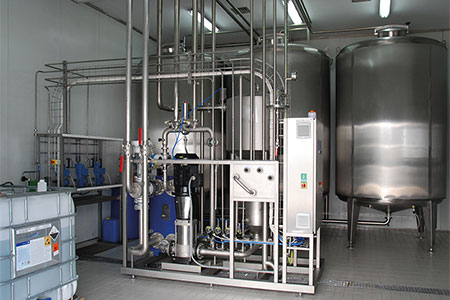Using a blended caustic product, or the inclusion of an additive to caustic, could improve the overall cleaning result and increase the efficiency of CIP processes.
Sodium hydroxide (caustic) or chlorinated alkaline cleaners (at pH 10-13) are commonly used in food and beverage manufacturing CIP (cleaning in place) processes to remove proteinaceous soils because of their efficacy in peptizing the bonds that hold proteins together.
During the cleaning process, interactions between proteins, carbohydrates and minerals can make proteins more resistant to the cleaning chemistry and produce the following conditions:
As a result, time spent on cleaning and sanitation is increased, which could impact on the production schedule, and more cleaning chemical is used, which could increase costs.

Depending on the conditions specific to the processing plant and cleaning requirements, using a blended caustic product, or the inclusion of an additive to caustic, could improve the overall cleaning result and increase the efficiency of CIP processes. Moreover, reducing the concentration of caustic in the cleaning chemistry formulation will reduce the neutralization requirement of the effluent system.
During the cleaning process, interactions between proteins, carbohydrates and minerals can make proteins more resistant to the cleaning chemistry
Diversey's Knowledge-based Services portfolio addresses key industry challenges under five core pillars of focus; Productivity, Water, Energy, Yield and Food Safety. All have a common goal of continually improving food safety and operational efficiency in food and beverage processing.
One of the services available is CIPCheck. During a CIPCheck, our sector specialists will:
The CIPCheck program provides a methodology for food, beverage and dairy processors to achieve the best cost of CIP clean possible whilst minimizing factory downtime. Selection of the most suitable cleaning chemistry, combined with information management systems, training and optimization plans will deliver real benefits and quantifiable savings for each site.
Our IntelliCIP cloud-based, data analysis platform for CIP data provides an easy-to-use visualization of chemical, water and energy usage for each CIP run in a summary dashboard. Consumption and related costs can be monitored alongside tools to help you better understand your CIP processes and where opportunities for optimization exist.